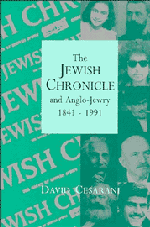Book contents
- Frontmatter
- Contents
- Preface
- Acknowledgements
- Introduction
- 1 Origins and pioneers, 1841–1855
- 2 Defining an identity: the Jewish Chronicle and mid-Victorian Anglo-Jewry, 1855–1878
- 3 The era of Asher Myers and Israel Davis, 1878–1906
- 4 The hegemony of Leopold Greenberg, 1907–1931
- 5 Discordant interlude: J. M. Rich and Mortimer Epstein, 1932–1936
- 6 Ivan Greenberg and the crisis years, 1937–1946
- 7 The post-war era: J. M. Shaftesley and David Kessler, 1946–1958
- 8 The Jewish Chronicle under William Frankel, 1958–1977
- 9 The Jewish press in a divided community: Geoffrey Paul, 1977–1990
- Conclusion
- Notes
- Bibliography
- Index
- Plate section
- Frontmatter
- Contents
- Preface
- Acknowledgements
- Introduction
- 1 Origins and pioneers, 1841–1855
- 2 Defining an identity: the Jewish Chronicle and mid-Victorian Anglo-Jewry, 1855–1878
- 3 The era of Asher Myers and Israel Davis, 1878–1906
- 4 The hegemony of Leopold Greenberg, 1907–1931
- 5 Discordant interlude: J. M. Rich and Mortimer Epstein, 1932–1936
- 6 Ivan Greenberg and the crisis years, 1937–1946
- 7 The post-war era: J. M. Shaftesley and David Kessler, 1946–1958
- 8 The Jewish Chronicle under William Frankel, 1958–1977
- 9 The Jewish press in a divided community: Geoffrey Paul, 1977–1990
- Conclusion
- Notes
- Bibliography
- Index
- Plate section
Summary
The Jewish press in England took root during the 1840s and 1850s, when the Jewish population was becoming more geographically dispersed and heterogeneous than ever before. British Jewry was divided spatially as well as socially, and sundered by controversy over the Reform congregation and conduct of the emancipation campaign. These developments, which had their parallel throughout the Jewish centres of western and central Europe, resulted from the dissolution of the traditional Jewish community. But the ending of the kehillah did not lead to the disappearance of the Jews as a distinct group. The emancipation and post-emancipation periods saw the reformulation of Jewish identity and the creation of new institutions by which it could be maintained and transmitted.
In Germany, France and Russia in the years during and after emancipation, the Jewish press was born and flourished as a central component of the new Jewish communities. In England, and later throughout the United Kingdom, the Jewish Chronicle provided an essential medium through which a new Jewish identity could be constructed. By creating a ‘public sphere’ in which the Jews could interact, define and share a set of common concerns, it was part of the process by which they constituted themselves as a modern, abstract community as against one that was founded on face-to-face relations as well as shared values.
After emancipation, in the 1860s and 1870s, the paper had a key role in working out the identity of British Jews as citizens.
- Type
- Chapter
- Information
- The Jewish Chronicle and Anglo-Jewry, 1841–1991 , pp. 248 - 253Publisher: Cambridge University PressPrint publication year: 1994

